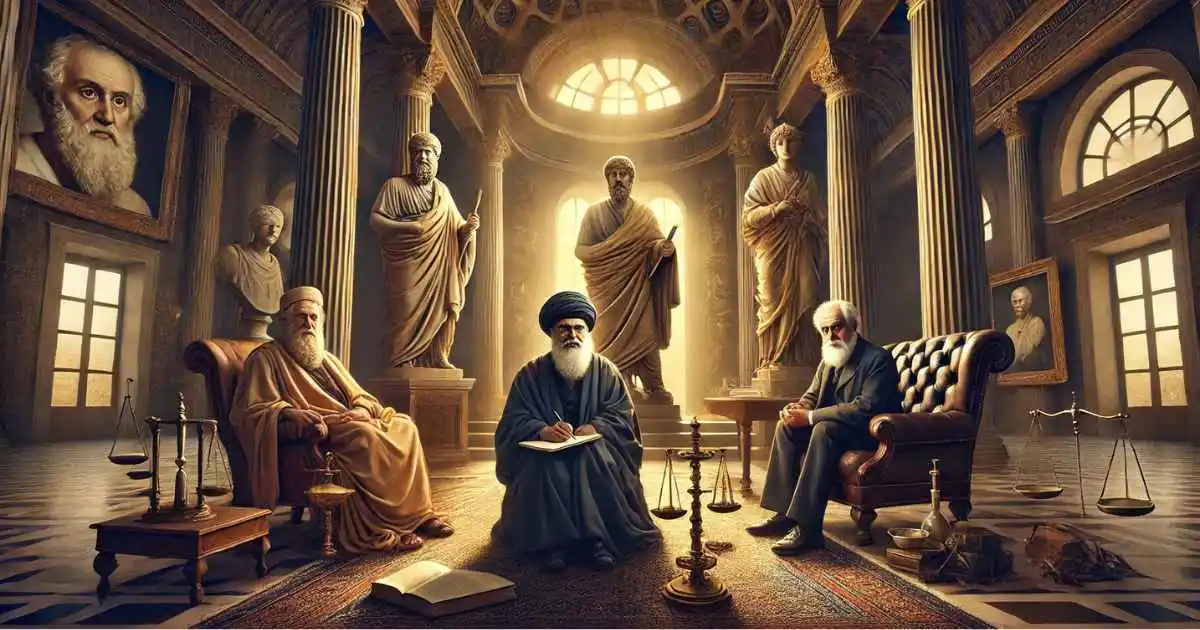The philosophical blueprint of psychology: From Plato to Freud
Know thyself
Etched into the temple of Delphi, this ancient maxim has echoed through the centuries, a timeless riddle posed to humanity. Who are we? Where do our thoughts, desires, and emotions come from? These questions have haunted philosophy since antiquity, and unknowingly, they laid the foundations of modern psychology.
Long before Freud and the advent of neuroscience, thinkers like Plato, Aristotle, Avicenna, and Descartes explored the workings of the human mind. Their reflections, often rooted in metaphysics, continue to influence our understanding of the human psyche today.
To study psychology without philosophy is to forget its deepest roots. This journey through time reveals how philosophical thought sowed the seeds of a science that still seeks to unravel the mysteries of consciousness and identity.
Ancient philosophy and the first theories of mind
In ancient Greece, Plato and Aristotle were already debating the nature of the soul and the mind. For them, understanding human beings began with questioning what animates us. Is the soul immortal? Separate from the body, or intrinsically bound to it?
Influenced by Pythagorean thought, Plato viewed the soul as an immaterial, eternal entity, imprisoned in the body. In his dialogue Phaedrus, he uses the metaphor of a charioteer steering two opposing horses: one noble and disciplined (representing courage and aspiration), the other unruly and driven by base desires. The charioteer, symbolizing reason, must keep these forces in balance to guide the soul toward wisdom.
🔗 Read also: Dostoevsky through Freud’s eyes
Aristotle, in contrast, adopted a more empirical stance. In De Anima (On the Soul), he rejected the idea of an independent soul and described it as the vital principle animating all living beings. He categorized its functions into vegetative (growth and nutrition), sensitive (perception and movement), and intellective (thought and reasoning). Unlike Plato’s vision of a transcendent soul destined for a higher world of ideas, Aristotle saw the soul as inseparable from the body, rooted in lived experience and observation.
Although Plato and Aristotle are the most renowned figures in ancient philosophy regarding the mind, they were neither the first nor the last to grapple with these questions. The Pre-Socratics had already speculated on life force and the mind-body relationship. Later schools, Stoicism, Epicureanism, Neoplatonism, continued these debates from various perspectives, leaving a lasting imprint on intellectual history. Despite shifts in terminology and focus, the central questions remain strikingly familiar.
Islamic philosophy: a bridge between antiquity and the modern era
Over centuries, philosophical thought was preserved and enriched across civilizations, finding new life in the Islamic world. Thinkers such as Avicenna (Ibn Sina) and Averroes (Ibn Rushd) not only safeguarded the Greek legacy but also expanded it with their own insights, particularly regarding the soul, perception, and reason. Their work formed a critical link between ancient philosophy and the modern psychological sciences.
Avicenna (980–1037), often called the father of medieval psychology, developed intricate theories of the soul and mind. In The Book of Healing, he explored perception, memory, and emotion, concepts that anticipated modern discussions of consciousness and the unconscious. He even described symptoms akin to depression and anxiety, centuries before these notions entered clinical discourse.
Averroes (1126–1198), one of Aristotle’s most influential commentators, profoundly shaped medieval Western philosophy. In his analyses of De Anima, he proposed a complex model of the intellect:
- The material (or passive) intellect: individual and receptive to sensory impressions.
- The agent (or active) intellect: universal and external, responsible for actualizing knowledge.
Averroes boldly argued that the agent intellect is shared by all humans, a form of universal and impersonal cognition. This radical idea challenged the Christian belief in individual, immortal souls, sparking intense debate in medieval Europe.
🔗 Explore further: From hysteria to science: The legacy of Jean-Martin Charcot
While Plato separated soul and body, Averroes, in line with Aristotle, advocated a more naturalistic view:
- The soul cannot exist without the body; it is its form (in Aristotelian hylomorphism).
- It governs vital and intellectual functions, although only rational thought persists after death.
Al-Ghazali (Abu Hamid Al-Ghazali, 1058–1111) proposed a contrasting vision, blending philosophy, theology, and spirituality. In The Revival of the Religious Sciences, he described the soul as a spiritual mirror, clouded by passions and worldly attachments. Unlike Avicenna and Averroes, Al-Ghazali emphasized a transcendent, immortal soul, accessible through inner purification and divine connection, a perspective shaped by Sufism and mysticism.
In The Incoherence of the Philosophers, he directly challenged the rationalist tradition, asserting that the soul preexists and outlives the body, aligning more closely with religious doctrine than Aristotelian philosophy. His work marked a turning point, steering Islamic thought toward a more spiritual understanding of the psyche.
Descartes and the mind-body divide
“I think, therefore I am.”
With this statement, René Descartes (1596–1650) laid the foundation of modern rationalism. For Descartes, thought is the only certainty that survives radical doubt. This led him to propose a strict dualism between mind and body, between the thinking substance (res cogitans) and the extended substance (res extensa).
Although distinct, Descartes argued, the two interact through the pineal gland, a curious hypothesis that would stir centuries of debate. His legacy still resonates: how can an immaterial mind arise from a physical brain? This question remains central to cognitive neuroscience and modern philosophy of mind.
Modern philosophers and their psychological legacy
From the 17th to the 19th century, numerous philosophers revisited questions about mind, perception, and consciousness. Among them, John Locke, Immanuel Kant, and Friedrich Nietzsche left a particularly profound imprint on modern psychology.
John Locke and empiricism
The English philosopher John Locke introduced a revolutionary idea: the human mind is a blank slate (tabula rasa). All knowledge and emotion, he claimed, arise from experience. This notion directly influenced behaviorism, which focuses solely on observable behavior and denies innate mental structures.
Immanuel Kant and the architecture of thought
Immanuel Kant (1724–1804) rejected the empiricist idea of a passive mind. Instead, he argued that the human mind imposes innate frameworks, such as time, space, and causality, onto raw experience. These are not features of the external world but of our cognitive architecture.
Kant’s theory helped pave the way for modern cognitive psychology, which investigates how the mind organizes and processes information. His insights still influence research on memory, perception, and decision-making.
🔗 Discover more: Animal magnetism: Mesmer’s intuitive glimpse into the unconscious
Friedrich Nietzsche and the unconscious
Friedrich Nietzsche (1844–1900), often linked to existentialism, also shaped psychological thought. His reflections on instincts and drives foreshadowed Freud’s theory of the unconscious. Nietzsche envisioned the psyche as a battlefield between reason and deep-seated desires, a vision that continues to inform therapeutic models today.
Psychoanalysis and its philosophical roots
Sigmund Freud (1856–1939), the father of psychoanalysis, did not sever ties with philosophy. On the contrary, his key concepts, the unconscious, psychic conflict, defense mechanisms, owe much to thinkers like Schopenhauer and Nietzsche.
In The World as Will and Representation, Arthur Schopenhauer described the will as an irrational, unconscious force shaping our thoughts and actions, an idea Freud would echo in his theory of repressed desires. Nietzsche’s focus on instincts and his critique of morality similarly shaped Freud’s model of a psyche torn between primal urges and social constraints.
Freud’s structural model divides the mind into:
- Id: seat of primitive drives.
- Ego: the mediator, balancing the Id and reality.
- Superego: internalized moral codes.
This dynamic echoes Plato’s chariot allegory: reason (the charioteer) striving to guide opposing forces toward harmony. Freud’s approach, while scientific in intention, remains deeply philosophical in lineage.
Later, existentialism and phenomenology further enriched psychoanalysis, reframing concepts like self-awareness and the human-world relationship. Freud’s quest to explore the unconscious was, in many ways, a continuation of age-old philosophical inquiries, recast in clinical form.
🔗 Read also: Surrealism and the Unconscious: when art delves into the depths of the mind
Behaviorism and the legacy of empiricism
Behaviorism, a movement that analyzes behavior through observable and measurable phenomena, draws directly from Locke’s empiricism. Viewing the mind as a black box, behaviorists reject introspection and focus instead on environmental conditioning.
Figures like John Watson and B.F. Skinner demonstrated how behavior is shaped by rewards and punishments. Their work revolutionized psychology, influencing education, therapy, and even neuroscience.
Humanistic psychology and existential thought
Humanistic psychology emphasizes autonomy, personal growth, and the search for meaning. In contrast to behaviorism’s focus on external stimuli or psychoanalysis’s emphasis on the unconscious, this approach believes in the human capacity for self-actualization.
Inspired by existentialist thinkers like Jean-Paul Sartre and Søren Kierkegaard, humanistic psychologists such as Carl Rogers and Abraham Maslow placed freedom and choice at the center of the therapeutic process. Maslow’s hierarchy of needs and Rogers’ emphasis on authenticity and empathy remain cornerstones of modern psychotherapy.
Despite their differences, these schools of thought share a philosophical lineage. Each, in its own way, continues the philosophical mission of exploring what it means to be human.
Wilhelm Wundt: a defining break
Often regarded as the founder of scientific psychology, Wilhelm Wundt redefined how the mind could be studied. Before Wundt, psychology remained a branch of speculative philosophy. In 1879, he established the first experimental psychology lab in Leipzig, marking the discipline’s official birth as a science.
Wundt pioneered experimental introspection: participants were exposed to specific stimuli and asked to report their inner experiences in controlled settings. While imperfect, this method introduced structure and replicability into the study of mental phenomena.
🔗 Read also: Wilhelm Wundt: The scientist who measured the mind
His legacy lies not only in his findings but in establishing an empirical approach that would underpin behaviorism, cognitive psychology, and modern neuroscience. Still, the separation between psychology and philosophy was never absolute.
Enduring philosophical questions in psychology
Psychology has certainly come into its own as a science. Nevertheless, the enduring questions that shape it are deeply philosophical. For all its advances in measurement, modeling, and experimentation, psychology continues to wrestle with age-old dilemmas:
Are we free agents or shaped by invisible mechanisms? Do we control our thoughts, or are we echoes of our biology and history?
Nature versus nurture: Are our gestures, desires, and fears written in our DNA or sculpted by society?
And above all, what is consciousness? A byproduct of neural activity, an illusion, or something beyond physical explanation?
These questions, far from resolved, remain vital. Psychology may strive to understand the human condition, but without philosophy, can it ever fully grasp itself?
References
Al-Ghazâlî, A.H. (2000). L’incohérence des philosophes (Tahâfut al-Falâsifa) (M.E. Marmura, Trad.). Brigham Young University Press. (Œuvre originale écrite au XIe siècle)
Aristote. (2004). De l’âme (Peri Psychês) (R. Bodéüs, Trad.). Flammarion. (Œuvre originale écrite vers 350 av. J.-C.)
Averroès. (2000). Grand Commentaire sur « De l’âme » d’Aristote (D. Black, Trad. et Ed.). Brigham Young University Press. (Œuvre originale rédigée au XIIe siècle)
Descartes, R. (1641/1990). Méditations métaphysiques (J.-L. Marion, Trad.). PUF. (Œuvre originale publiée en 1641)
Freud, S. (1923/2010). Le Moi et le Ça (P. Cotet, Trad.). PUF. (Œuvre originale publiée en 1923)
Maslow, A. H. (1954). Motivation and personality. Harper & Row.
Skinner, B. F. (1938). The behavior of organisms: An experimental analysis. Appleton-Century-Crofts.

Amine Lahhab
Television Director
Master’s Degree in Directing, École Supérieure de l’Audiovisuel (ESAV), University of Toulouse
Bachelor’s Degree in History, Hassan II University, Casablanca
DEUG in Philosophy, Hassan II University, Casablanca







